可接双宾语的动词
高中英语可接双宾语的38个常用动词

可接双宾语的38个常用动词(1) 双宾语易位需借助介词to的常用动词award sb. sth. = award sth. to sb.颁奖给某人bring sb. sth. = bring sth. to sb. 把某带给某人hand sb. sth. =hand sth. to sb.把某物递给某人lend sb. sth. = lend sth. to sb把某物借给ail sb. sth. = mail sth. to sb把某物寄给某人offer sb. sth. = offer sth. to sb. 将某物给某人owe sb. sth. = owe sth. to sb. 欠某人某物pass sb. sth. = pass sth. to sb.把某物递给某人pay sb. sth. = pay sth. to sb. 付给某人钱post sb. sth. = post sth. to sb.把某物寄给某人read sb. sth. = read sth. to sb 把某物读给某人听return sb. sth. = return sth. to sb. 把某物还给某人send sb. sth. = send sth. to sb. 把某物送给某人sell sb. sth. = sell sth. to sb. 把某物卖给某人serve sb. sth. = serve sth. to sb 拿某物招待某人show sb. sth. = show sth. to sb 把某物给某人看take sb. sth. = take sth. to sb 把某物带给某人teach sb. sth. = teach sth. to sb. 教某人某事tell sb. sth. = tell sth. to sb. 告诉某人某事throw sb. sth. = throw sth. to sb 把某物扔给某人write sb. sth. = write sth. to sb. 给某人写某事(2) 双宾语易位时需借助介词for的常用动词book sb. sth. = book sth. for sb. 为某人预定某物buy sb. sth. = buy sth. for sb. 为某人买某物choose sb. sth. = choose sth. for sb. 为某人选某物cook sb. sth. = cook sth. for sb. 为某人煮某物draw sb. sth. = draw sth. for sb. 为某人画某物fetch sb. sth. = fetch sth. for sb.为某人去取某物find sb. sth. = find sth. for sb. 为某人找到某物fix sb. sth. = fix sth. for sb. 为某人准备某物get sb. sth. = get sth. for sb. 为某人拿来某物make sb. sth. = make sth. for sb. 为某人做某物order sb. sth. = order sth. for sb 为某订购某物pick sb. sth. = pick sth. for sb. 为某人采摘某物prepare sb. sth. = prepare sth. for sb. 为某人准备某物save sb. sth. = save sth. for sb. 为某人留某物sing sb. sth. = sing sth. for sb. 为某人唱歌spare sb. sth. = spare sth.for sb 为某人让出某物steal sb. sth. = steal sth. for sb. 为某人偷某物。
中学英语中可接双宾语的40个常用动词

中学英语中可接双宾语的40个常用动词双宾语易位时需借助介词to 的常用动词1.award sb sth = award sb. 颁奖给某人2.bring sb sth =bring sth. to sb. 把某物带给某人3.give sb. sth =give sth. to sb. 把某物给木人4.hand sb. sth =hand sth. to sb. 把某物递给某人5.lend sb. sth =lend sth. to sb. 把某物借给某人6.mail sb. sth =mail sth. to sb. 将某物奇给某人7.offer sb. sth =offer sth. to sb. 将某物给某人8.owe sb. sth =owe sth. to sb. 欠某人某物9.pass sb. sth =pass sth. to sb. 把某物递给某人10.pay sb. sth =pay sth. to sb. 付给某人某物(钱)11.post sb. sth =post sth. to sb. 把某物读给某人听12.read sb. sth =read sth. to sb. 把某物读给某人听13.return sb. sth =return sth. to sb. 把某物还给某人14.send sb. sth =send sth. to sb. 把某物送给某人15.sell sb. sth =sell sth. to sb. 把某物卖给某人16.serve sb. sth =serve sth. to sb. 拿某物招待某人17.show sb. sth =show sth. to sb 拿某物给某人看.18.take sb. sth =take sth. to sb. 把某物拿给某人19.teach sb. sth =teach sth. to sb. 教某人某物20.tell sb. sth =tell sth. to sb. 告诉某人某情况21.throw sb. sth =throw sth. to sb. 把某物仍给某人22.write sb. sth =write sth. to sb. 给某恩写信(2) 双宾语易位时需借助介词for 的常用动词23.book sb. sth =book sth. for sb. 为某人预订某物24.buy sb. sth =buy sth. for sb. 为某人买某物25.choose sb. sth =choose sth. for sb. 为某人选某物26.cook sb. sth =cook sth. for sb. 为某人煮某物27.draw sb. sth =draw sth. for sb. 为某人画某物28.fetch sb. sth =fetch sth. for sb. 为某人去取某物29.find sb. sth =find sth. for sb. 为某人找某物30.fix sb. sth =fix sth. for sb. 为某人准备某物31.get sb. sth =get sth. for sb. 为某人拿来某物32.make sb. sth =make sth. for sb. 为某人做某物33.prepare sb. sth =prepare sth. for sb. 为某人准备某物34.save sb. sth =save sth. for sb. 为某人留某物35.sing sb. sth =sing sth. for sb. 为某人唱歌36.spare sb. sth =spare sth. for sb. 为某人让出某物37.steal sb. sth =steal sth. for sb. 为某人偷某物38.lose sb. sth =lose sth. for sb. 为某人献出某物(生命)39.order sb. sth =order sth. for sb. 为某人订购某物40.pick sb. sth =pick sth. for sb. 为某人采摘某物。
可接双宾语的个常用动词
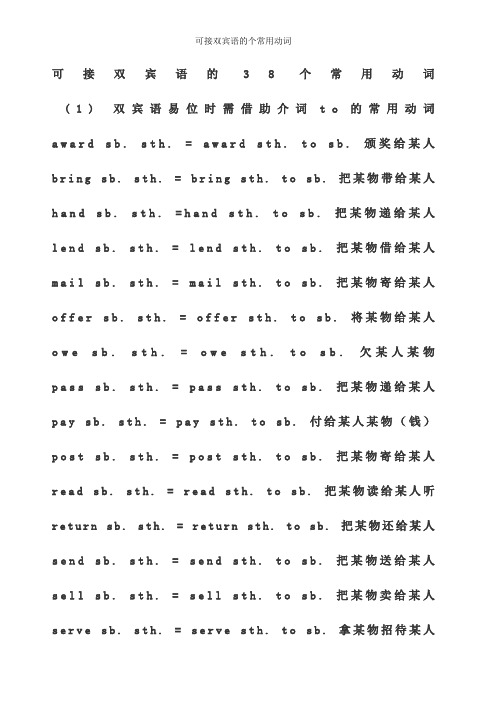
可接双宾语的38个常用动词(1)双宾语易位时需借助介词t o的常用动词a w a r d s b.s t h.=a w a r d s t h.t o s b.颁奖给某人b r i n g s b.s t h.=b r i n g s t h.t o s b.把某物带给某人h a n d s b.s t h.=h a n d s t h.t o s b.把某物递给某人l e n d s b.s t h.=l e n d s t h.t o s b.把某物借给某人m a i l s b.s t h.=m a i l s t h.t o s b.把某物寄给某人o f f e r s b.s t h.=o f f e r s t h.t o s b.将某物给某人o w e s b.s t h.=o w e s t h.t o s b.欠某人某物p a s s s b.s t h.=p a s s s t h.t o s b.把某物递给某人p a y s b.s t h.=p a y s t h.t o s b.付给某人某物(钱)p o s t s b.s t h.=p o s t s t h.t o s b.把某物寄给某人r e a d s b.s t h.=r e a d s t h.t o s b.把某物读给某人听r e t u r n s b.s t h.=r e t u r n s t h.t o s b.把某物还给某人s e n d s b.s t h.=s e n d s t h.t o s b.把某物送给某人s e l l s b.s t h.=s e l l s t h.t o s b.把某物卖给某人s e r v e s b.s t h.=s e r v e s t h.t o s b.拿某物招待某人s h o w s b.s t h.=s h o w s t h.t o s b.拿某物给某人看t a k e s b.s t h.=t a k e s t h.t o s b.把某物拿给某人t e a c h s b.s t h.=t e a c h s t h.t o s b.教某人某物t e l l s b.s t h.=t e l l s t h.t o s b.告诉某人某情况throw sb. sth. = throw sth. to sb. 把某物扔给某人write sb. sth. = write sth. to sb. 给某人写信(2) 双宾语易位时需借助介词for的常用动词book sb. sth. = book sth. for sb. 为某人预定某物buy sb. sth. = buy sth. for sb. 为某人买某物choose sb. sth. = choose sth. for sb. 为某人选某物cook sb. sth. = cook sth. for sb. 为某人煮某物draw sb. sth. = draw sth. for sb. 为某人画某物fetch sb. sth. = fetch sth. for sb. 为某人去取某物find sb. sth. = find sth. for sb. 为某人找到某物fix sb. sth. = fix sth. for sb. 为某人准备某物get sb. sth. = get sth. for sb. 为某人拿来某物make sb. sth. = make sth. for sb. 为某人做某物or der sb. sth. = order sth. for sb. 为某人订购某物pick sb. sth. = pick sth. for sb. 为某人采摘某物prepare sb. sth. = prepare sth. for sb. 为某人准备某物save sb. sth. = save sth. for sb. 为某人留某物sing sb. sth. = sing sth. for sb. 为某人唱某物(歌)spare sb. sth. = spare sth. for sb. 为某人让出某物steal sb. sth. = steal sth. for sb. 为某人偷某物注:有的动词后接的双宾语易位时,既可用介词to引出间接宾语,也可用介词for引出间接宾语,含义相同,如bring,play等:Bring me today’s paper. = Bring today’s paper to [for] me. 把今天的报纸拿给我。
可接双宾语的常用动词汇总
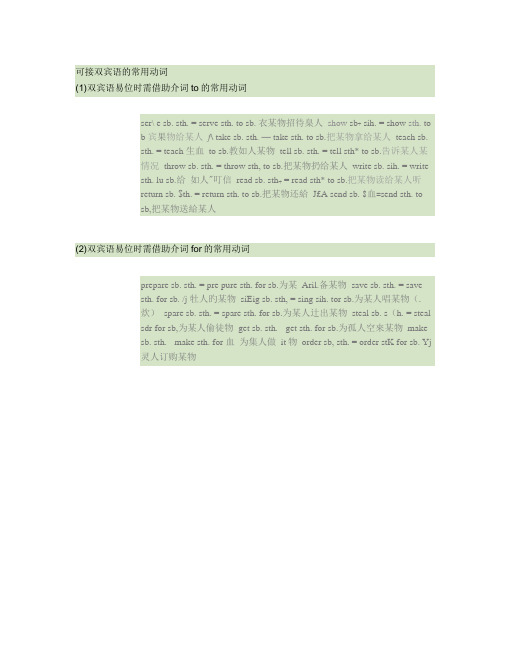
注:①有的动词后接的双宾语易位时,既可用介词to引出间接宾语,也可用介词
for引出间接宾语,含义相同,如bring,play等:
Bring me today ' s paper. = Bring today ' s pape把今天的me纸拿给我。
He played us the record he had just bought. = He played the record he had just bought for [to] us.他放了他刚买的唱片给我们听。
②而有的动词后接双宾语时,既不能用介词to引出间接宾语,也不能用介词for
弓丨出间接宾语,女口ask, cause, charge, cost, forgive, refus等:
He asked me some questi ons他问了我一些问题。
This caused me much trouble着给我带来了许多麻烦。
He charged me five dollars for a cup of tea他一杯茶向我要了5 美元。
His mistake cost him his job.他的错误让他丢了工作。
I envy you your good luck.我羡慕你的好运。
They forgave him his rudeness他们原谅了他的鲁莽He refused her nothing.她要什么就给什么
③以下几种情况通常要用介词to或for引起的短语,而不用动词+sb. sth形式的:1)当直接宾语是人称代词(it/them)时。
如:。
可接双宾语的动词

常用的能接双宾语的及物动词有:give, teach, buy, lend, find, hand, leave, sell, show, read, pay, make, offer, build, pass, bring, cook, refuse等。
I’ll fetch you a chair.我给你拿一只椅子。
(a chair是直接宾语,you是间接宾语)间接宾语可以用一个由to( 表示动作方向)或for (表示动作目标)引起的短语来表示。
这时,间接宾语置于直接宾语之后。
我们可以把上面例句改写为:I'll fetch a chair for you.一般用法如下:for example:give sth to sb = give sb sth.一、双宾语英语中,有些及物动词可接两个宾语(双宾语),即指人的间接宾语和指物的直接宾语。
常用句型为:主语+及物动词+间接宾语+直接宾语。
如:She gave me a cup of tea.她给了我一杯茶.有时,间接宾语也可改为由介词to或for引起的短语,放在直接宾语的后面。
如:She passed him the salt. =She passed the salt to him.她把盐递给了他。
Her uncle bought her an English-Chinese dictionary yesterday. = Her uncle bought an English-Chinese dictionary for her yesterday.昨天,她叔叔给她买了一本英汉词典。
双宾语的特殊情况下面几种情况,通常要用介词to或for引起的短语:1. 当直接宾语是人称代词(it/them),间接宾语是名词时:或两个宾语都是人称代词时。
如:The watch is Li Lei's. Please give it to him.这块手表是李雷的。
可接双宾语的38个常用动词
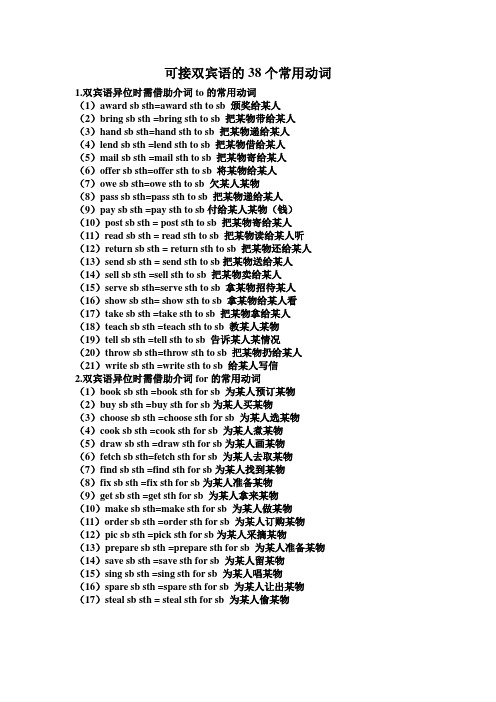
可接双宾语的38个常用动词1.双宾语异位时需借助介词to的常用动词(1)award sb sth=award sth to sb 颁奖给某人(2)bring sb sth =bring sth to sb 把某物带给某人(3)hand sb sth=hand sth to sb 把某物递给某人(4)lend sb sth =lend sth to sb 把某物借给某人(5)mail sb sth =mail sth to sb 把某物寄给某人(6)offer sb sth=offer sth to sb 将某物给某人(7)owe sb sth=owe sth to sb 欠某人某物(8)pass sb sth=pass sth to sb 把某物递给某人(9)pay sb sth =pay sth to sb付给某人某物(钱)(10)post sb sth = post sth to sb 把某物寄给某人(11)read sb sth = read sth to sb 把某物读给某人听(12)return sb sth = return sth to sb 把某物还给某人(13)send sb sth = send sth to sb把某物送给某人(14)sell sb sth =sell sth to sb 把某物卖给某人(15)serve sb sth=serve sth to sb 拿某物招待某人(16)show sb sth= show sth to sb 拿某物给某人看(17)take sb sth =take sth to sb 把某物拿给某人(18)teach sb sth =teach sth to sb 教某人某物(19)tell sb sth =tell sth to sb 告诉某人某情况(20)throw sb sth=throw sth to sb 把某物扔给某人(21)write sb sth =write sth to sb 给某人写信2.双宾语异位时需借助介词for的常用动词(1)book sb sth =book sth for sb 为某人预订某物(2)buy sb sth =buy sth for sb为某人买某物(3)choose sb sth =choose sth for sb 为某人选某物(4)cook sb sth =cook sth for sb 为某人煮某物(5)draw sb sth =draw sth for sb为某人画某物(6)fetch sb sth=fetch sth for sb 为某人去取某物(7)find sb sth =find sth for sb为某人找到某物(8)fix sb sth =fix sth for sb为某人准备某物(9)get sb sth =get sth for sb 为某人拿来某物(10)make sb sth=make sth for sb 为某人做某物(11)order sb sth =order sth for sb 为某人订购某物(12)pic sb sth =pick sth for sb为某人采摘某物(13)prepare sb sth =prepare sth for sb 为某人准备某物(14)save sb sth =save sth for sb 为某人留某物(15)sing sb sth =sing sth for sb 为某人唱某物(16)spare sb sth =spare sth for sb 为某人让出某物(17)steal sb sth = steal sth for sb 为某人偷某物测试卷1.John先生去年叫我们英语。
可接双宾语的38个常用动词
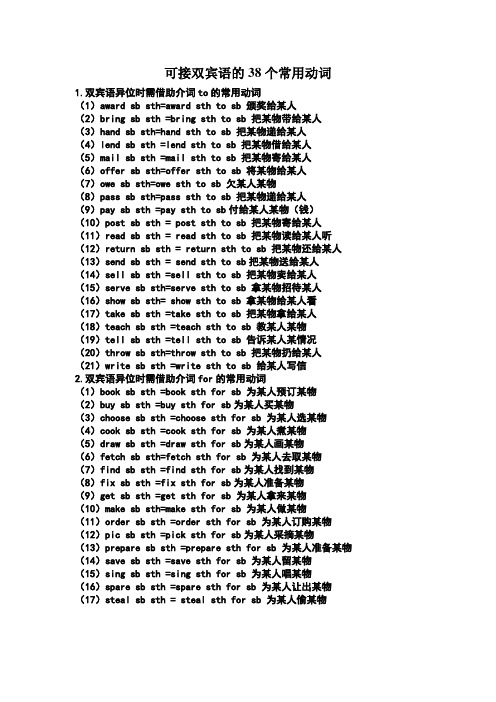
可接双宾语的38个常用动词1.双宾语异位时需借助介词to的常用动词(1)award sb sth=award sth to sb 颁奖给某人(2)bring sb sth =bring sth to sb 把某物带给某人(3)hand sb sth=hand sth to sb 把某物递给某人(4)lend sb sth =lend sth to sb 把某物借给某人(5)mail sb sth =mail sth to sb 把某物寄给某人(6)offer sb sth=offer sth to sb 将某物给某人(7)owe sb sth=owe sth to sb 欠某人某物(8)pass sb sth=pass sth to sb 把某物递给某人(9)pay sb sth =pay sth to sb付给某人某物(钱)(10)post sb sth = post sth to sb 把某物寄给某人(11)read sb sth = read sth to sb 把某物读给某人听(12)return sb sth = return sth to sb 把某物还给某人(13)send sb sth = send sth to sb把某物送给某人(14)sell sb sth =sell sth to sb 把某物卖给某人(15)serve sb sth=serve sth to sb 拿某物招待某人(16)show sb sth= show sth to sb 拿某物给某人看(17)take sb sth =take sth to sb 把某物拿给某人(18)teach sb sth =teach sth to sb 教某人某物(19)tell sb sth =tell sth to sb 告诉某人某情况(20)throw sb sth=throw sth to sb 把某物扔给某人(21)write sb sth =write sth to sb 给某人写信2.双宾语异位时需借助介词for的常用动词(1)book sb sth =book sth for sb 为某人预订某物(2)buy sb sth =buy sth for sb为某人买某物(3)choose sb sth =choose sth for sb 为某人选某物(4)cook sb sth =cook sth for sb 为某人煮某物(5)draw sb sth =draw sth for sb为某人画某物(6)fetch sb sth=fetch sth for sb 为某人去取某物(7)find sb sth =find sth for sb为某人找到某物(8)fix sb sth =fix sth for sb为某人准备某物(9)get sb sth =get sth for sb 为某人拿来某物(10)make sb sth=make sth for sb 为某人做某物(11)order sb sth =order sth for sb 为某人订购某物(12)pic sb sth =pick sth for sb为某人采摘某物(13)prepare sb sth =prepare sth for sb 为某人准备某物(14)save sb sth =save sth for sb 为某人留某物(15)sing sb sth =sing sth for sb 为某人唱某物(16)spare sb sth =spare sth for sb 为某人让出某物(17)steal sb sth = steal sth for sb 为某人偷某物测试卷1.John先生去年叫我们英语。
(完整word版)50个可接双宾语的动词
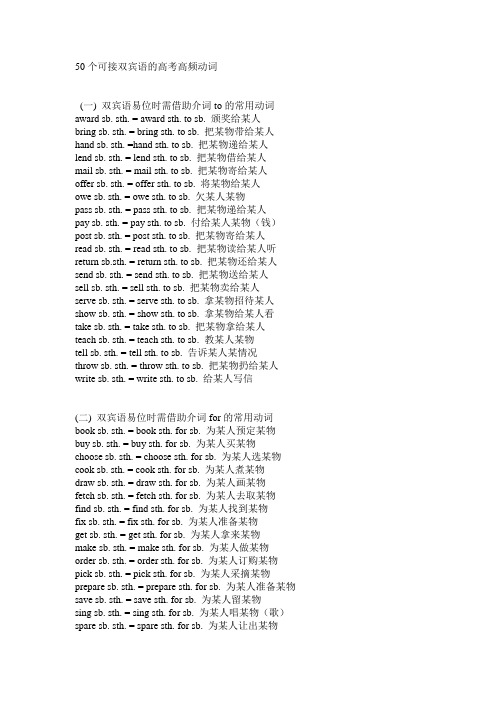
50个可接双宾语的高考高频动词(一) 双宾语易位时需借助介词to的常用动词award sb. sth. = award sth. to sb. 颁奖给某人bring sb. sth. = bring sth. to sb. 把某物带给某人hand sb. sth. =hand sth. to sb. 把某物递给某人lend sb. sth. = lend sth. to sb. 把某物借给某人mail sb. sth. = mail sth. to sb. 把某物寄给某人offer sb. sth. = offer sth. to sb. 将某物给某人owe sb. sth. = owe sth. to sb. 欠某人某物pass sb. sth. = pass sth. to sb. 把某物递给某人pay sb. sth. = pay sth. to sb. 付给某人某物(钱)post sb. sth. = post sth. to sb. 把某物寄给某人read sb. sth. = read sth. to sb. 把某物读给某人听return sb.sth. = return sth. to sb. 把某物还给某人send sb. sth. = send sth. to sb. 把某物送给某人sell sb. sth. = sell sth. to sb. 把某物卖给某人serve sb. sth. = serve sth. to sb. 拿某物招待某人show sb. sth. = show sth. to sb. 拿某物给某人看take sb. sth. = take sth. to sb. 把某物拿给某人teach sb. sth. = teach sth. to sb. 教某人某物tell sb. sth. = tell sth. to sb. 告诉某人某情况throw sb. sth. = throw sth. to sb. 把某物扔给某人write sb. sth. = write sth. to sb. 给某人写信(二) 双宾语易位时需借助介词for的常用动词book sb. sth. = book sth. for sb. 为某人预定某物buy sb. sth. = buy sth. for sb. 为某人买某物choose sb. sth. = choose sth. for sb. 为某人选某物cook sb. sth. = cook sth. for sb. 为某人煮某物draw sb. sth. = draw sth. for sb. 为某人画某物fetch sb. sth. = fetch sth. for sb. 为某人去取某物find sb. sth. = find sth. for sb. 为某人找到某物fix sb. sth. = fix sth. for sb. 为某人准备某物get sb. sth. = get sth. for sb. 为某人拿来某物make sb. sth. = make sth. for sb. 为某人做某物order sb. sth. = order sth. for sb. 为某人订购某物pick sb. sth. = pick sth. for sb. 为某人采摘某物prepare sb. sth. = prepare sth. for sb. 为某人准备某物save sb. sth. = save sth. for sb. 为某人留某物sing sb. sth. = sing sth. for sb. 为某人唱某物(歌)spare sb. sth. = spare sth. for sb. 为某人让出某物steal sb. sth. = steal sth. for sb. 为某人偷某物(三)有的动词后接的双宾语易位时,既可用介词to引出间接宾语,也可用介词for引出间接宾语,含义相同。
可接双宾语的38个常用动词教学教材

可接双宾语的38个常用动词可接双宾语的38个常用动词(1) 双宾语易位时需借助介词to的常用动词award sb. sth. = award sth. to sb. 颁奖给某人bring sb. sth. = bring sth. to sb. 把某物带给某人hand sb. sth. =hand sth. to sb. 把某物递给某人lend sb. sth. = lend sth. to sb. 把某物借给某人mail sb. sth. = mail sth. to sb. 把某物寄给某人offer sb. sth. = offer sth. to sb. 将某物给某人owe sb. sth. = owe sth. to sb. 欠某人某物pass sb. sth. = pass sth. to sb. 把某物递给某人pay sb. sth. = pay sth. to sb. 付给某人某物(钱)post sb. sth. = post sth. to sb. 把某物寄给某人read sb. sth. = read sth. to sb. 把某物读给某人听return sb. sth. = return sth. to sb. 把某物还给某人send sb. sth. = send sth. to sb. 把某物送给某人sell sb. sth. = sell sth. to sb. 把某物卖给某人serve sb. sth. = serve sth. to sb. 拿某物招待某人show sb. sth. = show sth. to sb. 拿某物给某人看take sb. sth. = take sth. to sb. 把某物拿给某人teach sb. sth. = teach sth. to sb. 教某人某物tell sb. sth. = tell sth. to sb. 告诉某人某情况throw sb. sth. = throw sth. to sb. 把某物扔给某人write sb. sth. = write sth. to sb. 给某人写信(2) 双宾语易位时需借助介词for的常用动词book sb. sth. = book sth. for sb. 为某人预定某物buy sb. sth. = buy sth. for sb. 为某人买某物choose sb. sth. = choose sth. for sb. 为某人选某物cook sb. sth. = cook sth. for sb. 为某人煮某物draw sb. sth. = draw sth. for sb. 为某人画某物fetch sb. sth. = fetch sth. for sb. 为某人去取某物find sb. sth. = find sth. for sb. 为某人找到某物fix sb. sth. = fix sth. for sb. 为某人准备某物get sb. sth. = get sth. for sb. 为某人拿来某物make sb. sth. = make sth. for sb. 为某人做某物or der sb. sth. = order sth. for sb. 为某人订购某物pick sb. sth. = pick sth. for sb. 为某人采摘某物prepare sb. sth. = prepare sth. for sb. 为某人准备某物save sb. sth. = save sth. for sb. 为某人留某物sing sb. sth. = sing sth. for sb. 为某人唱某物(歌)spare sb. sth. = spare sth. for sb. 为某人让出某物steal sb. sth. = steal sth. for sb. 为某人偷某物注:有的动词后接的双宾语易位时,既可用介词to引出间接宾语,也可用介词for引出间接宾语,含义相同,如bring,play等:Bring me today’s paper. = Bring today’s paper to [for] me. 把今天的报纸拿给我。
可接双宾语的常用动词

可接双宾语的常用动词
常用的可以接双宾语的动词有:
1. give(给):She gave me a gift.(她给了我一份礼物。
)
2. show(展示):He showed me a photo.(他给我展示了一张照片。
)
3. tell(告诉):They told us a story.(他们给我们讲了一个故事。
)
4. send(发送):She sent me an email.(她给我发送了一封电子邮件。
)
5. offer(提供):He offered me a job.(他给我提供了一份工作。
)
6. lend(借出):Can you lend me some money?(你能借我一些钱吗?)
7. buy(买):She bought him a present.(她给他买了一份礼物。
)
8. make(制作):They made me a cake.(他们给我做了一个蛋糕。
)
9. teach(教):He taught me a new skill.(他教给我一项新技能。
)
10. offer(提供):They offered us a discount.(他们给我们提供了折扣。
)。
高二英语可接双宾语的常用动词

⾼⼆英语可接双宾语的常⽤动词 ⾼⼆英语测试能全⾯检测学⽣在英语词汇、语法,甚⾄是句法上的运⽤能⼒,能更科学地反映学⽣的英语综合⽔平。
接下来⼩编为⼤家整理了⾼⼆英语学习内容,⼀起来看看吧! ⾼⼆英语可接双宾语的常⽤动词 (1) 双宾语易位时需借助介词to的常⽤动词 award sb. sth. = award sth. to sb. 颁奖给某⼈ bring sb. sth. = bring sth. to sb. 把某物带给某⼈ hand sb. sth. =hand sth. to sb. 把某物递给某⼈ lend sb. sth. = lend sth. to sb. 把某物借给某⼈ mail sb. sth. = mail sth. to sb. 把某物寄给某⼈ offer sb. sth. = offer sth. to sb. 将某物给某⼈ owe sb. sth. = owe sth. to sb. 把……归功于某⼈;⽋某⼈某物 pass sb. sth. = pass sth. to sb. 把某物递给某⼈ pay sb. sth. = pay sth. to sb. 付给某⼈某物(钱) post sb. sth. = post sth. to sb. 把某物寄给某⼈ read sb. sth. = read sth. to sb. 把某物读给某⼈听 return sb. sth. = return sth. to sb. 把某物还给某⼈ send sb. sth. = send sth. to sb. 把某物送给某⼈ sell sb. sth. = sell sth. to sb. 把某物卖给某⼈ serve sb. sth. = serve sth. to sb. 拿某物招待某⼈ show sb. sth. = show sth. to sb. 拿某物给某⼈看 take sb. sth. = take sth. to sb. 把某物拿给某⼈ teach sb. sth. = teach sth. to sb. 教某⼈某物 tell sb. sth. = tell sth. to sb. 告诉某⼈某情况 throw sb. sth. = throw sth. to sb. 把某物扔给某⼈ write sb. sth. = write sth. to sb. 给某⼈写信 (2) 双宾语易位时需借助介词for的常⽤动词 book sb. sth. = book sth. for sb. 为某⼈预定某物 buy sb. sth. = buy sth. for sb. 为某⼈买某物 choose sb. sth. = choose sth. for sb. 为某⼈选某物 cook sb. sth. = cook sth. for sb. 为某⼈煮某物 draw sb. sth. = draw sth. for sb. 为某⼈画某物 fetch sb. sth. = fetch sth. for sb. 为某⼈去取某物 find sb. sth. = find sth. for sb. 为某⼈找到某物 fix sb. sth. = fix sth. for sb. 为某⼈准备某物 get sb. sth. = get sth. for sb. 为某⼈拿来某物 make sb. sth. = make sth. for sb. 为某⼈做某物 order sb. sth. = order sth. for sb. 为某⼈订购某物 pick sb. sth. = pick sth. for sb. 为某⼈采摘某物 prepare sb. sth. = prepare sth. for sb. 为某⼈准备某物 save sb. sth. = save sth. for sb. 为某⼈留某物 sing sb. sth. = sing sth. for sb. 为某⼈唱某物(歌) spare sb. sth. = spare sth. for sb. 为某⼈让出某物 steal sb. sth. = steal sth. for sb. 为某⼈偷某物 注:有的动词后接的双宾语易位时,既可⽤介词to引出间接宾语,也可⽤介词for引出间接宾语,含义相同,如bring,play等: Bring me today’s paper. = Bring today’s paper to [for] me. 把今天的报纸拿给我。
50个可接双宾语的动词上课讲义

50个可接双宾语的动词50个可接双宾语的高考高频动词(一) 双宾语易位时需借助介词to的常用动词award sb. sth. = award sth. to sb. 颁奖给某人bring sb. sth. = bring sth. to sb. 把某物带给某人hand sb. sth. =hand sth. to sb. 把某物递给某人lend sb. sth. = lend sth. to sb. 把某物借给某人mail sb. sth. = mail sth. to sb. 把某物寄给某人offer sb. sth. = offer sth. to sb. 将某物给某人owe sb. sth. = owe sth. to sb. 欠某人某物pass sb. sth. = pass sth. to sb. 把某物递给某人pay sb. sth. = pay sth. to sb. 付给某人某物(钱)post sb. sth. = post sth. to sb. 把某物寄给某人read sb. sth. = read sth. to sb. 把某物读给某人听return sb.sth. = return sth. to sb. 把某物还给某人send sb. sth. = send sth. to sb. 把某物送给某人sell sb. sth. = sell sth. to sb. 把某物卖给某人serve sb. sth. = serve sth. to sb. 拿某物招待某人show sb. sth. = show sth. to sb. 拿某物给某人看take sb. sth. = take sth. to sb. 把某物拿给某人teach sb. sth. = teach sth. to sb. 教某人某物tell sb. sth. = tell sth. to sb. 告诉某人某情况throw sb. sth. = throw sth. to sb. 把某物扔给某人write sb. sth. = write sth. to sb. 给某人写信(二) 双宾语易位时需借助介词for的常用动词book sb. sth. = book sth. for sb. 为某人预定某物buy sb. sth. = buy sth. for sb. 为某人买某物choose sb. sth. = choose sth. for sb. 为某人选某物cook sb. sth. = cook sth. for sb. 为某人煮某物draw sb. sth. = draw sth. for sb. 为某人画某物fetch sb. sth. = fetch sth. for sb. 为某人去取某物find sb. sth. = find sth. for sb. 为某人找到某物fix sb. sth. = fix sth. for sb. 为某人准备某物get sb. sth. = get sth. for sb. 为某人拿来某物make sb. sth. = make sth. for sb. 为某人做某物order sb. sth. = order sth. for sb. 为某人订购某物pick sb. sth. = pick sth. for sb. 为某人采摘某物prepare sb. sth. = prepare sth. for sb. 为某人准备某物save sb. sth. = save sth. for sb. 为某人留某物sing sb. sth. = sing sth. for sb. 为某人唱某物(歌)spare sb. sth. = spare sth. for sb. 为某人让出某物steal sb. sth. = steal sth. for sb. 为某人偷某物(三)有的动词后接的双宾语易位时,既可用介词to引出间接宾语,也可用介词for引出间接宾语,含义相同。
50个可接双宾语的动词
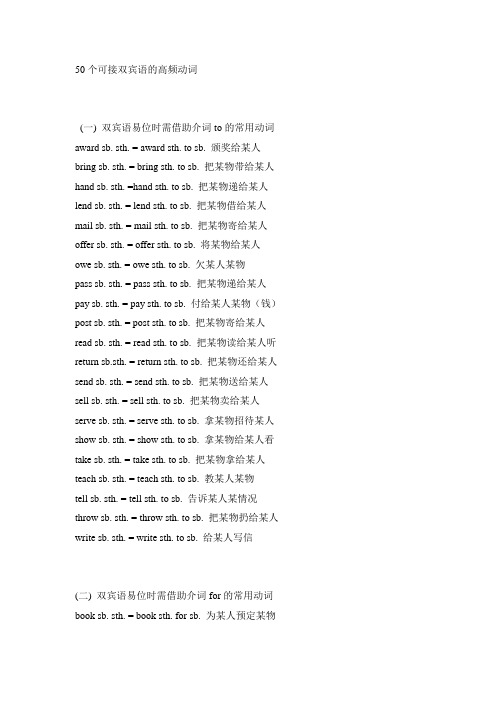
50个可接双宾语的高频动词(一) 双宾语易位时需借助介词to的常用动词award sb. sth. = award sth. to sb. 颁奖给某人bring sb. sth. = bring sth. to sb. 把某物带给某人hand sb. sth. =hand sth. to sb. 把某物递给某人lend sb. sth. = lend sth. to sb. 把某物借给某人mail sb. sth. = mail sth. to sb. 把某物寄给某人offer sb. sth. = offer sth. to sb. 将某物给某人owe sb. sth. = owe sth. to sb. 欠某人某物pass sb. sth. = pass sth. to sb. 把某物递给某人pay sb. sth. = pay sth. to sb. 付给某人某物(钱)post sb. sth. = post sth. to sb. 把某物寄给某人read sb. sth. = read sth. to sb. 把某物读给某人听return sb.sth. = return sth. to sb. 把某物还给某人send sb. sth. = send sth. to sb. 把某物送给某人sell sb. sth. = sell sth. to sb. 把某物卖给某人serve sb. sth. = serve sth. to sb. 拿某物招待某人show sb. sth. = show sth. to sb. 拿某物给某人看take sb. sth. = take sth. to sb. 把某物拿给某人teach sb. sth. = teach sth. to sb. 教某人某物tell sb. sth. = tell sth. to sb. 告诉某人某情况throw sb. sth. = throw sth. to sb. 把某物扔给某人write sb. sth. = write sth. to sb. 给某人写信(二) 双宾语易位时需借助介词for的常用动词book sb. sth. = book sth. for sb. 为某人预定某物buy sb. sth. = buy sth. for sb. 为某人买某物choose sb. sth. = choose sth. for sb. 为某人选某物cook sb. sth. = cook sth. for sb. 为某人煮某物draw sb. sth. = draw sth. for sb. 为某人画某物fetch sb. sth. = fetch sth. for sb. 为某人去取某物find sb. sth. = find sth. for sb. 为某人找到某物fix sb. sth. = fix sth. for sb. 为某人准备某物get sb. sth. = get sth. for sb. 为某人拿来某物make sb. sth. = make sth. for sb. 为某人做某物order sb. sth. = order sth. for sb. 为某人订购某物pick sb. sth. = pick sth. for sb. 为某人采摘某物prepare sb. sth. = prepare sth. for sb. 为某人准备某物save sb. sth. = save sth. for sb. 为某人留某物sing sb. sth. = sing sth. for sb. 为某人唱某物(歌)spare sb. sth. = spare sth. for sb. 为某人让出某物steal sb. sth. = steal sth. for sb. 为某人偷某物(三)有的动词后接的双宾语易位时,既可用介词to引出间接宾语,也可用介词for引出间接宾语,含义相同。
50个可接双宾语的高考高频动词

50个可接双宾语的高考高频动词(一) 双宾语易位时需借助介词to的常用动词1.award sb. sth. = award sth. to sb. 颁奖给某人2.bring sb. sth. = bring sth. to sb. 把某物带给某人3.hand sb. sth. =hand sth. to sb. 把某物递给某人4.lend sb. sth. = lend sth. to sb. 把某物借给某人5.mail sb. sth. = mail sth. to sb. 把某物寄给某人6.offer sb. sth. = offer sth. to sb. 将某物给某人7.owe sb. sth. = owe sth. to sb. 欠某人某物8.pass sb. sth. = pass sth. to sb. 把某物递给某人9.pay sb. sth. = pay sth. to sb. 付给某人某物(钱)10.post sb. sth. = post sth. to sb. 把某物寄给某人11.read sb. sth. = read sth. to sb. 把某物读给某人听12.return sb.sth. = return sth. to sb. 把某物还给某人13.send sb. sth. = send sth. to sb. 把某物送给某人14.sell sb. sth. = sell sth. to sb. 把某物卖给某人15.serve sb. sth. = serve sth. to sb. 拿某物招待某人16.show sb. sth. = show sth. to sb. 拿某物给某人看17.take sb. sth. = take sth. to sb. 把某物拿给某人18.teach sb. sth. = teach sth. to sb. 教某人某物19.tell sb. sth. = tell sth. to sb. 告诉某人某情况20.throw sb. sth. = throw sth. to sb. 把某物扔给某人21.write sb. sth. = write sth. to sb. 给某人写信(二) 双宾语易位时需借助介词for的常用动词1.book sb. sth. = book sth. for sb. 为某人预定某物2.buy sb. sth. = buy sth. for sb. 为某人买某物3.choose sb. sth. = choose sth. for sb. 为某人选某物4.cook sb. sth. = cook sth. for sb. 为某人煮某物5.draw sb. sth. = draw sth. for sb. 为某人画某物6.fetch sb. sth. = fetch sth. for sb. 为某人去取某物7.find sb. sth. = find sth. for sb. 为某人找到某物8.fix sb. sth. = fix sth. for sb. 为某人准备某物9.get sb. sth. = get sth. for sb. 为某人拿来某物10.make sb. sth. = make sth. for sb. 为某人做某物11.order sb. sth. = order sth. for sb. 为某人订购某物12.pick sb. sth. = pick sth. for sb. 为某人采摘某物13.prepare sb. sth. = prepare sth. for sb. 为某人准备某物14.save sb. sth. = save sth. for sb. 为某人留某物15.sing sb. sth. = sing sth. for sb. 为某人唱某物(歌)16.spare sb. sth. = spare sth. for sb. 为某人让出某物17.steal sb. sth. = steal sth. for sb. 为某人偷某物(三)有的动词后接的双宾语易位时,既可用介词to引出间接宾语,也可用介词for引出间接宾语,含义相同。
可接双宾语的常用动词(最新整理)
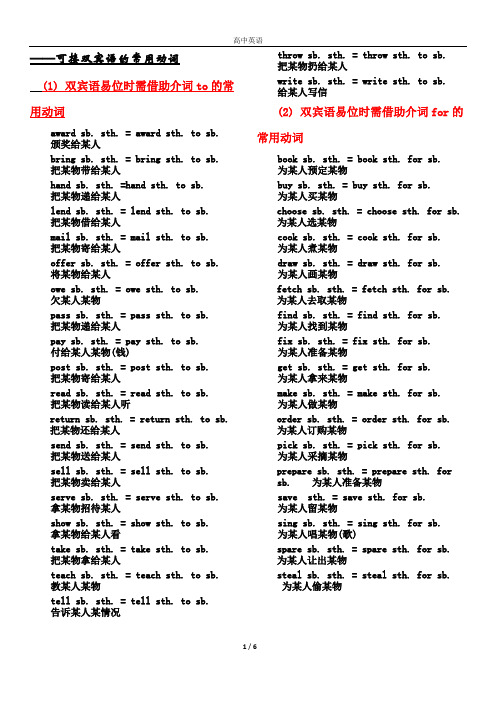
——可接双宾语的常用动词 (1) 双宾语易位时需借助介词to的常用动词award sb. sth. = award sth. to sb.颁奖给某人bring sb. sth. = bring sth. to sb.把某物带给某人hand sb. sth. =hand sth. to sb.把某物递给某人lend sb. sth. = lend sth. to sb.把某物借给某人mail sb. sth. = mail sth. to sb.把某物寄给某人offer sb. sth. = offer sth. to sb.将某物给某人owe sb. sth. = owe sth. to sb.欠某人某物pass sb. sth. = pass sth. to sb.把某物递给某人pay sb. sth. = pay sth. to sb.付给某人某物(钱)post sb. sth. = post sth. to sb.把某物寄给某人read sb. sth. = read sth. to sb.把某物读给某人听 return sb. sth. = return sth. to sb.把某物还给某人send sb. sth. = send sth. to sb.把某物送给某人sell sb. sth. = sell sth. to sb.把某物卖给某人serve sb. sth. = serve sth. to sb.拿某物招待某人show sb. sth. = show sth. to sb.拿某物给某人看take sb. sth. = take sth. to sb.把某物拿给某人teach sb. sth. = teach sth. to sb.教某人某物tell sb. sth. = tell sth. to sb.告诉某人某情况throw sb. sth. = throw sth. to sb.把某物扔给某人write sb. sth. = write sth. to sb.给某人写信 (2) 双宾语易位时需借助介词for的常用动词book sb. sth. = book sth. for sb.为某人预定某物buy sb. sth. = buy sth. for sb.为某人买某物 choose sb. sth. = choose sth. for sb.为某人选某物cook sb. sth. = cook sth. for sb.为某人煮某物draw sb. sth. = draw sth. for sb.为某人画某物 fetch sb. sth. = fetch sth. for sb.为某人去取某物find sb. sth. = find sth. for sb.为某人找到某物fix sb. sth. = fix sth. for sb.为某人准备某物get sb. sth. = get sth. for sb.为某人拿来某物make sb. sth. = make sth. for sb.为某人做某物 order sb. sth. = order sth. for sb.为某人订购某物pick sb. sth. = pick sth. for sb.为某人采摘某物 prepare sb. sth. = prepare sth. for sb. 为某人准备某物save sth. = save sth. for sb.为某人留某物sing sb. sth. = sing sth. for sb.为某人唱某物(歌) spare sb. sth. = spare sth. for sb.为某人让出某物 steal sb. sth. = steal sth. for sb.为某人偷某物有的动词后接的双宾语易位时,既可用介词to引出间接宾语,也可用介词for引出间接宾语,含义相同 如:bring,playBring me today’s paper. = Bring today’s paper to [for] me.把今天的报纸拿给我。
可接双宾语的38个常用动词
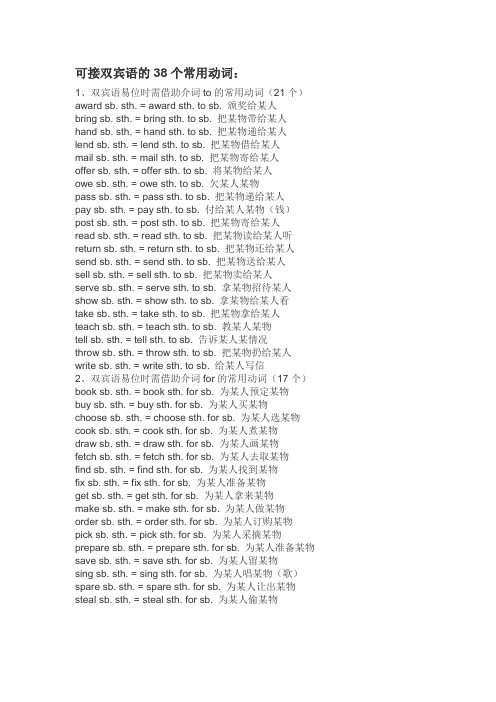
可接双宾语的38个常用动词:1、双宾语易位时需借助介词to的常用动词(21个)award sb. sth. = award sth. to sb. 颁奖给某人bring sb. sth. = bring sth. to sb. 把某物带给某人hand sb. sth. = hand sth. to sb. 把某物递给某人lend sb. sth. = lend sth. to sb. 把某物借给某人mail sb. sth. = mail sth. to sb. 把某物寄给某人offer sb. sth. = offer sth. to sb. 将某物给某人owe sb. sth. = owe sth. to sb. 欠某人某物pass sb. sth. = pass sth. to sb. 把某物递给某人pay sb. sth. = pay sth. to sb. 付给某人某物(钱)post sb. sth. = post sth. to sb. 把某物寄给某人read sb. sth. = read sth. to sb. 把某物读给某人听return sb. sth. = return sth. to sb. 把某物还给某人send sb. sth. = send sth. to sb. 把某物送给某人sell sb. sth. = sell sth. to sb. 把某物卖给某人serve sb. sth. = serve sth. to sb. 拿某物招待某人show sb. sth. = show sth. to sb. 拿某物给某人看take sb. sth. = take sth. to sb. 把某物拿给某人teach sb. sth. = teach sth. to sb. 教某人某物tell sb. sth. = tell sth. to sb. 告诉某人某情况throw sb. sth. = throw sth. to sb. 把某物扔给某人write sb. sth. = write sth. to sb. 给某人写信2、双宾语易位时需借助介词for的常用动词(17个)book sb. sth. = book sth. for sb. 为某人预定某物buy sb. sth. = buy sth. for sb. 为某人买某物choose sb. sth. = choose sth. for sb. 为某人选某物cook sb. sth. = cook sth. for sb. 为某人煮某物draw sb. sth. = draw sth. for sb. 为某人画某物fetch sb. sth. = fetch sth. for sb. 为某人去取某物find sb. sth. = find sth. for sb. 为某人找到某物fix sb. sth. = fix sth. for sb. 为某人准备某物get sb. sth. = get sth. for sb. 为某人拿来某物make sb. sth. = make sth. for sb. 为某人做某物order sb. sth. = order sth. for sb. 为某人订购某物pick sb. sth. = pick sth. for sb. 为某人采摘某物prepare sb. sth. = prepare sth. for sb. 为某人准备某物save sb. sth. = save sth. for sb. 为某人留某物sing sb. sth. = sing sth. for sb. 为某人唱某物(歌)spare sb. sth. = spare sth. for sb. 为某人让出某物steal sb. sth. = steal sth. for sb. 为某人偷某物。
可以接双宾语的动词及变化

可以接双宾语的动词一、双宾语易位时需借助介词to的常用动词award sb. sth. = award sth. to sb. 颁奖给某人bring sb. sth. = bring sth. to sb. 把某物带给某人hand sb. sth. =hand sth. to sb. 把某物递给某人lend sb. sth. = lend sth. to sb. 把某物借给某人mail sb. sth. = mail sth. to sb. 把某物寄给某人offer sb. sth. = offer sth. to sb. 将某物给某人owe sb. sth. = owe sth. to sb. 欠某人某物pass sb. sth. = pass sth. to sb. 把某物递给某人pay sb. sth. = pay sth. to sb. 付给某人某物(钱)post sb. sth. = post sth. to sb. 把某物寄给某人read sb. sth. = read sth. to sb. 把某物读给某人听return . = return sth. to sb. 把某物还给某人send sb. sth. = send sth. to sb. 把某物送给某人sell sb. sth. = sell sth. to sb. 把某物卖给某人serve sb. sth. = serve sth. to sb. 拿某物招待某人show sb. sth. = show sth. to sb. 拿某物给某人看take sb. sth. = take sth. to sb. 把某物拿给某人teach sb. sth. = teach sth. to sb. 教某人某物tell sb. sth. = tell sth. to sb. 告诉某人某情况throw sb. sth. = throw sth. to sb. 把某物扔给某人write sb. sth. = write sth. to sb. 给某人写信二、双宾语易位时需借助介词for的常用动词book sb. sth. = book sth. for sb. 为某人预定某物buy sb. sth. = buy sth. for sb. 为某人买某物choose sb. sth. = choose sth. for sb. 为某人选某物cook sb. sth. = cook sth. for sb. 为某人煮某物draw sb. sth. = draw sth. for sb. 为某人画某物fetch sb. sth. = fetch sth. for sb. 为某人去取某物find sb. sth. = find sth. for sb. 为某人找到某物fix sb. sth. = fix sth. for sb. 为某人准备某物get sb. sth. = get sth. for sb. 为某人拿来某物make sb. sth. = make sth. for sb. 为某人做某物order sb. sth. = order sth. for sb. 为某人订购某物pick sb. sth. = pick sth. for sb. 为某人采摘某物prepare sb. sth. = prepare sth. for sb. 为某人准备某物save sb. sth. = save sth. for sb. 为某人留某物sing sb. sth. = sing sth. for sb. 为某人唱某物(歌)spare sb. sth. = spare sth. for sb. 为某人让出某物steal sb. sth. = steal sth. for sb. 为某人偷某物三、而有的动词后接双宾语时,既不能用介词to引出间接宾语,也不能用介词for引出间接宾语。
可接双宾语的动词
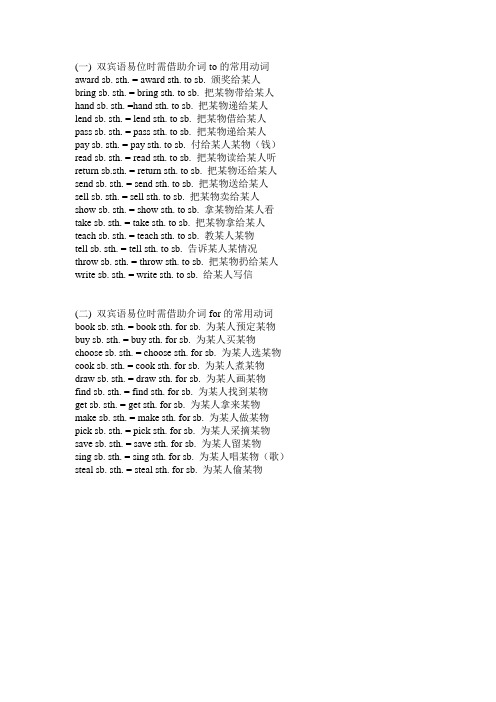
(一) 双宾语易位时需借助介词to的常用动词award sb. sth. = award sth. to sb. 颁奖给某人bring sb. sth. = bring sth. to sb. 把某物带给某人hand sb. sth. =hand sth. to sb. 把某物递给某人lend sb. sth. = lend sth. to sb. 把某物借给某人pass sb. sth. = pass sth. to sb. 把某物递给某人pay sb. sth. = pay sth. to sb. 付给某人某物(钱)read sb. sth. = read sth. to sb. 把某物读给某人听return sb.sth. = return sth. to sb. 把某物还给某人send sb. sth. = send sth. to sb. 把某物送给某人sell sb. sth. = sell sth. to sb. 把某物卖给某人show sb. sth. = show sth. to sb. 拿某物给某人看take sb. sth. = take sth. to sb. 把某物拿给某人teach sb. sth. = teach sth. to sb. 教某人某物tell sb. sth. = tell sth. to sb. 告诉某人某情况throw sb. sth. = throw sth. to sb. 把某物扔给某人write sb. sth. = write sth. to sb. 给某人写信(二) 双宾语易位时需借助介词for的常用动词book sb. sth. = book sth. for sb. 为某人预定某物buy sb. sth. = buy sth. for sb. 为某人买某物choose sb. sth. = choose sth. for sb. 为某人选某物cook sb. sth. = cook sth. for sb. 为某人煮某物draw sb. sth. = draw sth. for sb. 为某人画某物find sb. sth. = find sth. for sb. 为某人找到某物get sb. sth. = get sth. for sb. 为某人拿来某物make sb. sth. = make sth. for sb. 为某人做某物pick sb. sth. = pick sth. for sb. 为某人采摘某物save sb. sth. = save sth. for sb. 为某人留某物sing sb. sth. = sing sth. for sb. 为某人唱某物(歌)steal sb. sth. = steal sth. for sb. 为某人偷某物。
英语接双宾语的常用动词汇总
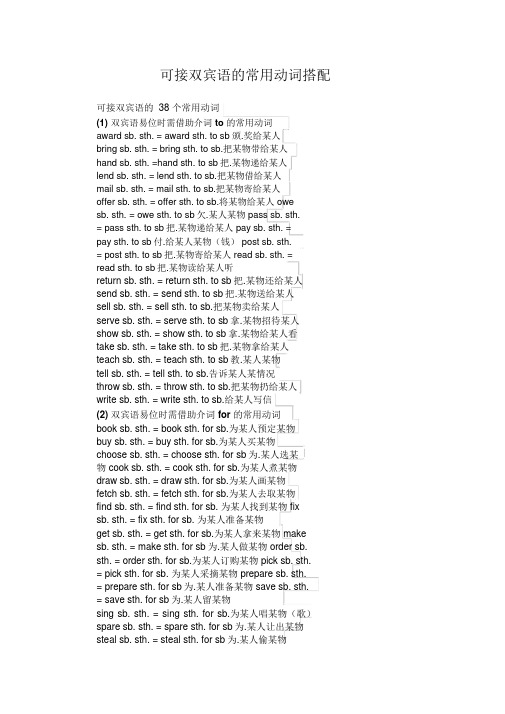
可接双宾语的常用动词搭配可接双宾语的 38 个常用动词(1)双宾语易位时需借助介词 to 的常用动词award sb. sth. = award sth. to sb颁.奖给某人bring sb. sth. = bring sth. to sb.把某物带给某人hand sb. sth. =hand sth. to sb把.某物递给某人lend sb. sth. = lend sth. to sb.把某物借给某人mail sb. sth. = mail sth. to sb.把某物寄给某人offer sb. sth. = offer sth. to sb.将某物给某人 owesb. sth. = owe sth. to sb欠.某人某物 pass sb. sth.= pass sth. to sb把.某物递给某人 pay sb. sth. =pay sth. to sb付.给某人某物(钱) post sb. sth.= post sth. to sb把.某物寄给某人 read sb. sth. =read sth. to sb把.某物读给某人听return sb. sth. = return sth. to sb把.某物还给某人send sb. sth. = send sth. to sb把.某物送给某人sell sb. sth. = sell sth. to sb.把某物卖给某人serve sb. sth. = serve sth. to sb拿.某物招待某人show sb. sth. = show sth. to sb拿.某物给某人看take sb. sth. = take sth. to sb把.某物拿给某人teach sb. sth. = teach sth. to sb教.某人某物tell sb. sth. = tell sth. to sb.告诉某人某情况throw sb. sth. = throw sth. to sb.把某物扔给某人write sb. sth. = write sth. to sb.给某人写信(2)双宾语易位时需借助介词 for 的常用动词book sb. sth. = book sth. for sb.为某人预定某物buy sb. sth. = buy sth. for sb.为某人买某物choose sb. sth. = choose sth. for sb为.某人选某物 cook sb. sth. = cook sth. for sb.为某人煮某物draw sb. sth. = draw sth. for sb.为某人画某物fetch sb. sth. = fetch sth. for sb.为某人去取某物find sb. sth. = find sth. for sb. 为某人找到某物 fixsb. sth. = fix sth. for sb. 为某人准备某物get sb. sth. = get sth. for sb.为某人拿来某物 make sb. sth. = make sth. for sb为.某人做某物 order sb. sth. = order sth. for sb.为某人订购某物 pick sb. sth.= pick sth. for sb. 为某人采摘某物 prepare sb. sth.= prepare sth. for sb为.某人准备某物 save sb. sth.= save sth. for sb为.某人留某物sing sb. sth. = sing sth. for sb.为某人唱某物(歌)spare sb. sth. = spare sth. for sb为.某人让出某物steal sb. sth. = steal sth. for sb为.某人偷某物注:有的动词后接的双宾语易位时,既可用介词 to 引出间接宾语,也可用介词 for 引出间接宾语,含义相同,如 bring, play 等:Bring me today ’s paper. = Bring today ’s paper to [for] me. 把今天的报纸拿给我。
- 1、下载文档前请自行甄别文档内容的完整性,平台不提供额外的编辑、内容补充、找答案等附加服务。
- 2、"仅部分预览"的文档,不可在线预览部分如存在完整性等问题,可反馈申请退款(可完整预览的文档不适用该条件!)。
- 3、如文档侵犯您的权益,请联系客服反馈,我们会尽快为您处理(人工客服工作时间:9:00-18:30)。
常用的能接双宾语的及物动词
有:give, teach, buy, lend, find, hand, leave, sell, show, read, pay, make, offer, build, pass, bring, cook, refuse等。
I’ll fetch you a chair.
我给你拿一只椅子。
(a chair是直接宾语,you是间接宾语)
间接宾语可以用一个由to( 表示动作方向)或for (表示动作目标)引起的短语来表示。
这时,间接宾语置于直接宾语之后。
我们可以把上面例句改写为:I'll fetch a chair for you.
一般用法如下:for example:
give sth to sb = give sb sth.
一、双宾语
英语中,有些及物动词可接两个宾语(双宾语),即指人的间接宾语和指物的直接宾语。
常用句型为:主语+及物动词+间接宾语+直接宾语。
如:She gave me a cup of tea.
她给了我一杯茶.
有时,间接宾语也可改为由介词to或for引起的短语,放在直接宾语的后面。
如:
She passed him the salt. =
She passed the salt to him.
她把盐递给了他。
Her uncle bought her an English-Chinese dictionary yesterday. = Her uncle bought an English-Chinese dictionary for her yesterday.
昨天,她叔叔给她买了一本英汉词典。
双宾语的特殊情况
下面几种情况,通常要用介词to或for引起的短语:
1. 当直接宾语是人称代词(it/them),间接宾语是名词时:或两个宾语都是人称代词时。
如:
The watch is Li Lei's. Please give it to him.
这块手表是李雷的。
请把它给他。
2. 当强调间接宾语时。
如:
Mother cooks breakfast for us every day.
母亲每天都为我们做早饭。
3. 当间接宾语比直接宾语长时。
如:
On the bus, he often gives his seat to an old person.
在公共汽车上,他经常把座位让给老人。
注:由to连接间接宾语的动词有:pass, give, show, tell, lend, take等;由for 连接间接宾语的动词有:buy, cook, get, sing, make等。
award sb. sth. = award sth. to sb. 颁奖给某人bring sb. sth. = bring sth. to sb. 把某物带给某人hand sb. sth. =hand sth. to sb. 把某物递给某人lend sb. sth. = lend sth. to sb. 把某物借给某人mail sb. sth. = mail sth. to sb. 把某物寄给某人offer sb. sth. = offer sth. to sb. 将某物给某人owe sb. sth. = owe sth. to sb. 欠某人某物
pass sb. sth. = pass sth. to sb. 把某物递给某人pay sb. sth. = pay sth. to sb. 付给某人某物(钱)post sb. sth. = post sth. to sb. 把某物寄给某人read sb. sth. = read sth. to sb. 把某物读给某人听return sb.sth. = return sth. to sb. 把某物还给某人send sb. sth. = send sth. to sb. 把某物送给某人sell sb. sth. = sell sth. to sb. 把某物卖给某人serve sb. sth. = serve sth. to sb. 拿某物招待某人show sb. sth. = show sth. to sb. 拿某物给某人看take sb. sth. = take sth. to sb. 把某物拿给某人teach sb. sth. = teach sth. to sb. 教某人某物
tell sb. sth. = tell sth. to sb. 告诉某人某情况throw sb. sth. = throw sth. to sb. 把某物扔给某人write sb. sth. = write sth. to sb. 给某人写信
book sb. sth. = book sth. for sb. 为某人预定某物
buy sb. sth. = buy sth. for sb. 为某人买某物
choose sb. sth. = choose sth. for sb. 为某人选某物
cook sb. sth. = cook sth. for sb. 为某人煮某物
draw sb. sth. = draw sth. for sb. 为某人画某物
fetch sb. sth. = fetch sth. for sb. 为某人去取某物
find sb. sth. = find sth. for sb. 为某人找到某物
fix sb. sth. = fix sth. for sb. 为某人准备某物
get sb. sth. = get sth. for sb. 为某人拿来某物
make sb. sth. = make sth. for sb. 为某人做某物
order sb. sth. = order sth. for sb. 为某人订购某物
pick sb. sth. = pick sth. for sb. 为某人采摘某物
prepare sb. sth. = prepare sth. for sb. 为某人准备某物
save sb. sth. = save sth. for sb. 为某人留某物
sing sb. sth. = sing sth. for sb. 为某人唱某物(歌)
spare sb. sth. = spare sth. for sb. 为某人让出某物
steal sb. sth. = steal sth. for sb. 为某人偷某物
(三)有的动词后接的双宾语易位时,既可用介词to引出间接宾语,也可用介词for引出间接宾语,含义相同。
如bring,play
等:
Bring me today’s paper.
= Bring today’s paper to [for] me. 把今天的报纸拿给我。
2. He played us the record he had just bought.
= He played the record he had just bought for [to] us. 他放了他刚买的唱片给我们听。
(四)有的动词后接的双宾语易位时,即可用介词to引出间接宾语,也可用介词for引出间接宾语,含义不同。
如leave等:They left me no food.
= They left no food for me.他们没给我留一点食物。
2. My uncle left me a large fortune.
= My uncle left a large fortune to me. 叔叔死后留下一大笔财产给我。
(五)而有的动词后接双宾语时,既不能用介词to引出间接宾语,也不能用介词for引出间接宾语。
如allow, ask, cause, charge, cost, forgive, refuse等:
He allows his son too much money.他给他儿子的钱太多。
He asked me some questions. 他问了我一些问题。
This caused me much trouble. 这给我带来了许多麻烦。
He charged me five dollars for a cup of tea.他一杯茶向我要了5美元。
His mistake cost him his job. 他的错误让他丢了工作。
I envy you your good luck. 我羡慕你的好运。
They forgave him his rudeness. 他们原谅了他的鲁莽。
He refused her nothing. 她要什么他就给什么。
